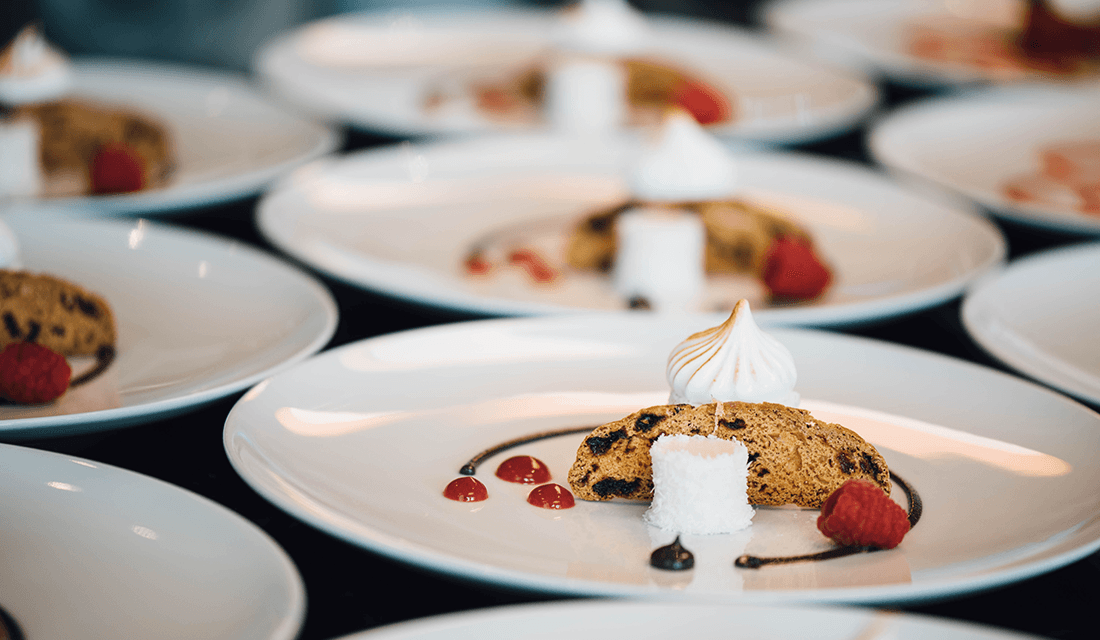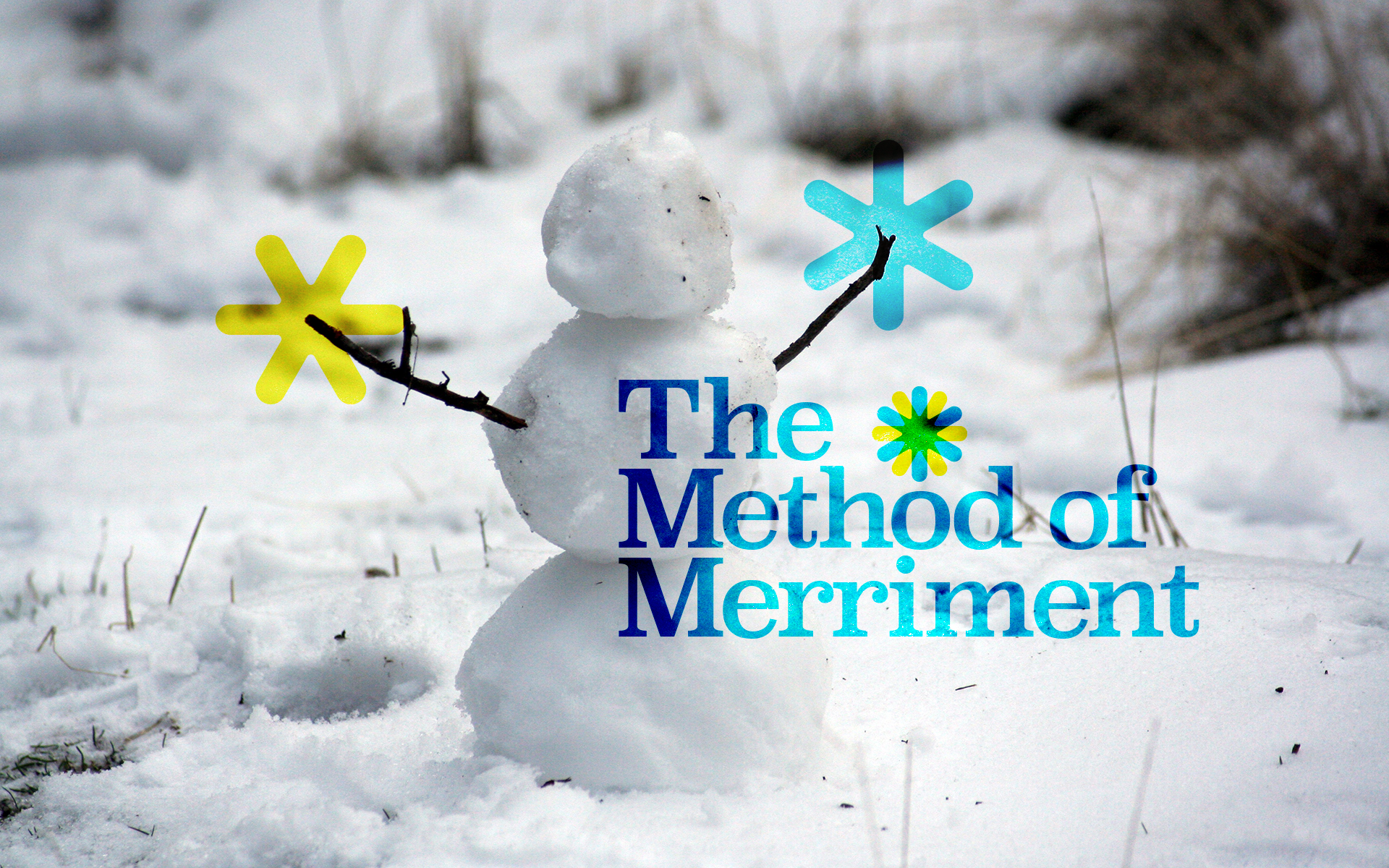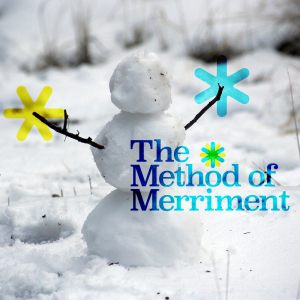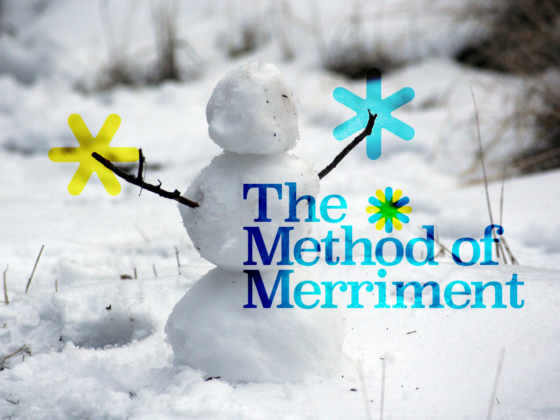EMMA CLARK
Boarding the Tube at rush hour is something I vehemently try to avoid — one of the small benefits of pursuing the performing arts as a career; the lack of stability at the very least allows me to time my commutes outside of office hours. These attempts have been thwarted lately by the rise of the afternoon holiday luncheon, or even the odd lunchtime corporate conference, a new one among the landscape of catering gigs I’ve thrown myself into in pursuit of holiday cash. I emerge from these shifts at the same time as everyone and their dog emerge from their 9-to-5’s, squishing myself precariously against the crowd at the edge of the opening and hoping the train doors close safely behind me.
As I board the Tube on my way home from the part of town where the majority of these functions occur (areas like Kensington and Westminster, St. James and Victoria), I find myself pressed up against a young woman with striking bottle red cropped hair. I notice her initially for her saddle bag, emblazoned with the crest of Hogwarts School of Witchcraft and Wizardry. She definitely purchased it at Primark, England’s less impressive analogy for Target, in their random but glorious Harry Potter collection (I know this having perused some socks there myself). I then clock our matching black oxfords, and upon further examination, I note that we are dressed identically, minus my lack of tie. I feel a flash of solidarity and recognition, though she studiously directs her gaze into her phone. I’ve located another comrade in this season’s holiday hustle, and I begin to — why? Will she be working through the middle of the month and then head home? Or is she like me, figuring that now is as good a time as any to work when you’ve got nowhere else to be?

Home Alone
There’s a very specific look of pity that enters a person’s face when you tell them that you have no plans for Christmas (and indeed are not Jewish either). They freeze up for the briefest of moments, their faces tinged ever so slightly with guilt. A simple statement of fact seems to belie an expectation, as if by offering up the plain truth I’m hoping they’ll beatifically invite me into their family homes. The accumulation of these reactions has led me to believe that few people I know, let alone myself, have any conception of a holiday season spent alone. As if by its very nature, December is meant to be spent with other people.
The majority of these events are ostensibly about Christmas, but also the furthest thing from it.
The fact of the matter is that this year, I’m stuck, unable to get off this island for the holidays whether I would like it or not. My previous visa expired inconveniently at the end of November, and the transfer process to acquire a new one takes up to eight weeks, which makes booking holiday travel a huge waste of money. Living sans documents until the new year, I’ve decided to embrace the copious amounts of holiday work that crop up each season in a metropolis as large as this one. Typically I run from it, putting down my holiday travel as an ultimatum or just quitting altogether. Again, this is a license that being an artistic freelancer affords, since at any given moment you’re likely to be working a rotating cast of jobs that treat you as mutually dispensable. I’m trying on things that are new, and inevitably temporary — the shop girl, the hostess, the cater waiter — and spending my holidays observing the holidays of others. I’m scurrying around London, a fly on the wall, witnessing ritual and spectacle, hope and expectation, deep in the underbelly of a host of places I never expected to find myself in.
The Palace
Standing fourth in line in my team of five, oversized plate and undersized meal in hand (gluten free on the left and regular on the right), I refuse the offer to rest my arms. We’re waiting for the back of the line to catch up before proceeding in formation into the dining room, and our final teammate has been cut off by a stream of other figures buzzing around in their uniform black attire. Plates for main courses tend to be heavy and hot, and the flimsy gloves we are given do little to mitigate the discomfort. The weight is a strain on the tendons below my wrists, a muscle group that has few logical reasons to be used on a daily basis and starts to ache if supporting weight for too long.

I keep my plates held high because I’ve been doing my best each shift to grit my teeth through the pain, figuring that the muscles will get stronger every time and eventually the pain will disappear. I quit waitressing a couple of years ago, so I haven’t had the occasion to use the skills required by catering in quite some time. It’s only been a few weeks, but already the repetition of just showing up and throwing myself into it has made me comfortable and confident. I smirk a tiny bit as some of my younger coworkers rest their plates by slumping against the counter top; my stubbornness on this occasion is all part of the ongoing practice I’ve been giving myself in confidence, self-assertion, and professionalism in unfamiliar spaces. The bliss of catering this season, beyond the much needed fast money, is that I can try anything on for a night, a new accent or a new persona if it amuses me and passes the time among the countless gala functions of London’s winter elite. This is supposedly a freedom that performing provides as well, but the pursuit of a career often keeps you tied inextricably to yourself. I take comfort and satisfaction in the knowledge that it is unlikely the guests will ever see me again – they have no idea who I am and no reason to, which means I’m genuinely free to present myself as whoever I’d like to be.
I’m scurrying around London, a fly on the wall, witnessing ritual and spectacle, hope and expectation, deep in the underbelly of a host of places I never expected to find myself in.
Dropping plates at the table adjacent to Prince Charles is surprisingly easy; he has his own butlers so none of us are required to attend to the royal himself. We are simply advised to stand within a ‘respectful’ distance and to avoid standing behind him, or we risk being tackled by said butlers. I stride rhythmically with my team through the kitchen and through a palace room that is larger than my entire flat. The gilded surroundings have been converted into a waiting area for staff during the charity-dinner-slash-solo-piano concert. By converted, I mean that we are using the room exactly as is, it just happens to be mostly empty and adjacent to tonight’s dining room, thematically blue as opposed to the red decor draped round the mini-thrones in the other hall. I catch a surreal glimpse of myself in a towering, aged mirror above a colonial vase, looking groomed and sharp in the outfit I’ll be wearing most often this month: white or black long-sleeved button-up shirt or overcoat, black trousers, hair slicked back into a neat bun, face occasionally attacked by the brush of an overzealous and underqualified ‘makeup artist.’
I’m fed well and leave quite contented from the night’s work at Buckingham Palace, a building that only opens its doors to the normal people of the world like myself for contained official tourism visits during the garden-friendly summer months. It strikes me as odd how simple and normal it all seemed, but another beauty of this line of survival work is that everything has its function, its rhythm, and its order. Beyond being proactive and efficient, there is little to second guess. The only thing out of place is my re-entry to the security entrance, where I collect my phone from a tiny locker and pass the desk where they had examined my ID and taken my photograph, a reminder of precisely where I am.

The Most Expensive House in London
At each function, I wander the floor offering canapés or Prosecco refills and find my favorite guests, the ones with a sense of humor who are digging into the food and open bar without reservation. I sidestep the guests that lead with aggression, or who look down their nose. I greet them with my signature mix of stern but cordial, peppered with an American inability to be fully polite around bullshit. There seems to be an air of obligation to each night, rather than an unrestrained enjoyment. The guests are there because they were invited, the night is exclusive, and they need to make their appearance, kiss the right cheeks and make the right kind of small talk. During multiple briefings we are told that guests are likely to be mixing business and pleasure, and to be aware of when to insert ourselves at a table and when to remain invisible.
Although I’ve begun to recognize and enjoy seeing some of the same faces at each event, staffing needs are so large at this time of year that, more often than not, I work with new people every time. The most common thread of small talk, given our proximity to December 25th, are what people actually do for a living and what people plan to do for Christmas. I answer honestly, rather than taking the easier option and just staying that I’m “going home.” As I brush off the tones of pity and loosen the guilty lines building tension in their faces, I’m unsettled. One, by the glazing over of the sheer economic privilege it requires to be able to go home for the holidays. Two, by the assumption that everyone can identify a home for the holidays. And three, by the pressure to set these particular days so far apart from the fabric of the rest of the year.

The former is especially aggravated by my being in the United Kingdom, a nation that is large in self-importance but small in land mass. With a developed and well-connected rail system, most people can be delivered back to their hometowns for a relatively affordable rate. Home for most of the people I speak to at the moment doesn’t require flying thousands of miles and investing more than a month’s rent. I’ve also never had a singular childhood home, and never find it easy or obvious to figure out which city I would be heading to for the holidays in the first place. More of my friends are beginning to experience this as their parents retire to places other than where they grew up, but the constant inconstancy of my physical ‘home’ differentiated me from many of my childhood peers.
Halfway out the door and already beating a hasty retreat toward signing out for the day, the event manager who had made several routine operations needlessly difficult inside London’s most expensive private home tossed a “Merry Christmas!” at my back, as she thanked me and said her goodbyes. Without a breaking stride, I hollered “Merry Christmas” back at her, out of courtesy. The majority of these events are ostensibly about Christmas, but also the furthest thing from it. They have the trappings of the season, the drive to mark the end of the year with some sort of holiday-dressed and decorated function. At a consulting company Christmas party in a museum, I was harnessed to a tiered box of bite-sized desserts, hawking snacks like I was at a baseball game while weaving my way through the debauchery. It looked like a cross between Halloween and prom, scored to the exuberant tunes of a confusing boy band/brass band/cover band combo playing today’s pop hits. The hilariously esoteric theme was interpreted by the guests to varying degrees of success, peppered by a multitude of women who had decided they were too embarrassed to really go for it and just turned up in their fanciest party dress. On the surface, these events might seem like the loneliest place in the world for someone spending Christmas alone — aggressively coated in holiday cheer and full of people who have been invited to gather and to celebrate together — but I find them oddly comforting, less isolating than just sitting on my bed in my apartment. I’m a part of a team with a precise sense of purpose, and increasingly I’ve observed that the party guests are just as alone in all of it as we are, but with the added pressures of being visible.
I take comfort and satisfaction in the knowledge that it is unlikely the guests will ever see me again – they have no idea who I am and no reason to, which means I’m genuinely free to present myself as whoever I’d like to be.
Thanksgiving Three Ways
During my third identical Thanksgiving luncheon in a row, hosted by an ex-American ambassador for his investment banking colleagues in London, it strikes me how difficult it is to parse out what I actually value about the holidays, the things I choose to seek out versus the ones that are a product of the circumstances under which I was raised. My associations with the holidays are a jumbled mix of American societal traditions, family traditions, and a Northern Hemispheric image of Christmas — snow-covered wonderlands and mulled everything at a market. I listen to my European coworkers puzzle over the contents of the Thanksgiving meal, coming back for their new favorites the next day as we eat leftovers and deriding the ones that confuse them. Once they realize I’m American, I’m questioned no less than four times about yams covered in marshmallows, a phenomena for which I have no explanation as it’s one that my family largely skipped.
I realize that my list of holiday must-haves is actually quite small. Strip those days of the people, the food, and the gifts, and they only mean as much as you make of them. Having lived so far from my parents for years at this point, lately I’ve spent most of my holidays trying on the traditions of other families, the ones who do congregate at a singular home every year. My mom has just departed from a pre-Christmas visit, avoiding the holiday travel crush. We marched around London picking and choosing our delights, but also indulging equally in simple time spent reading at a coffee shop or lounging in bed. We carried out a Christmas tradition weeks early, but were only able to complete it halfway — we made it to the local screening of Star Wars loaded with illicit grocery store candy, but wearing layers instead of our customary flannel pajamas, as it has actually snowed and the weather was just too cold. This tradition is a relatively new one, something that came to be simply because my mother willed it into existence, and the rest of us committed to it.

I’ve come to view this Christmas as a holiday of solitude, or strangers. A couple of weeks ago, I met that rarest of things — a genuine stranger in a public space with whom I shared a conversation and left the door open to maybe one day becoming friends. She was also the first person I had spoken to this month who, like me, would not be traveling home for the holidays. I keep going back and forth as to whether I want to gather these strangers and distant friends for some holiday company, to see if I can’t find a few people with some shared ideas about how the day might best be used. Or, whether it would be better to forget about any tentative plans and while the day away consuming a much neglected book. What I find myself seeking above all is warmth and intention, and hopefully the peace of just being visible to myself and content for a time, however things turn out to be.





